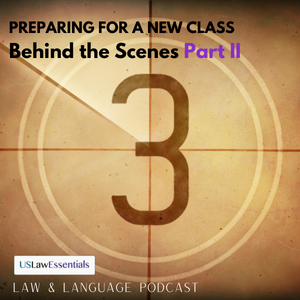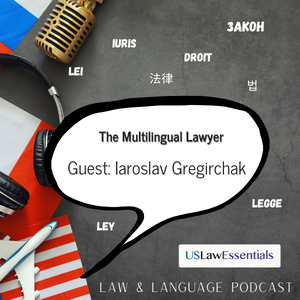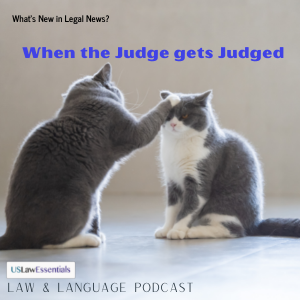Speaker 0 00:00:00 Welcome to the U S law essentials law and language podcast, the legal English podcast for non-native English speakers that helps you improve your English, listening, improve your legal English vocabulary and build your knowledge of American legal culture.
Speaker 1 00:00:19 Welcome to the U S law essentials law and language podcast. I'm Steven Horowitz
Speaker 0 00:00:26 And I'm Daniel Edelson.
Speaker 1 00:00:27 And today's episode is part of our what's new in the legal news series, where one of us picks a legal news event to talk about. And first we want to say thanks to everyone for your comments and feedback so far. We also want to remind you that we love when our listeners give us topic ideas and suggestions for future episodes. So if you want us to discuss a particular topic from the law or legal news, let us know by
[email protected] today, it's, Daniel's turn to pick a topic. So Daniel what'd you pick for us today? The topic
Speaker 0 00:01:06 I think that I chose, and we as always have a link to the article in our show notes is from CNN, Charlottesville, civil trial looks floor where free speech becomes conspiracy to commit violence. And this is a lawsuit that emerged from a violent white supremacist demonstration that took place in Charlottesville in 2017
Speaker 1 00:01:40 Charlottesville. Where is that Dan? Cause there's, I think there's a lot of places called Charlottesville in America. Now
Speaker 0 00:01:47 It's true. And this was Charlottesville, Virginia, and this actually took place near the university of Virginia. Do you remember this demonstration, Steve?
Speaker 1 00:01:58 Yeah, I remember seeing in the news and they definitely featured the people walking around in torch with, with those torches at night, it was a very sort of, um, intimidating kind of thing to see.
Speaker 0 00:02:12 Well, the people who participated in this demonstration certainly wanted to appear tough. They are usually referred to as either white supremacists or white nationalists. The name of the demonstration was unite the right, as in bring together people who are considered on the right wing of politics, but really this was a gathering of people who supported white supremacist views.
Speaker 1 00:02:43 Oh yeah, no was, I mean, there was the main thing that came out of it. I remember was somebody drove a car and hit some of the counter protestors and killed a woman that's right.
Speaker 0 00:02:55 One person was killed. There are also injuries. And those injuries occurred both in that car, car attack, and also in other physical physical attacks. So a number of people who were injured during the car attack and during other physical altercations are suing the people and the organizations that helped to organize this demonstration that took place in Charlottesville.
Speaker 1 00:03:31 So Dan, you said altercation, what's an altercation.
Speaker 0 00:03:36 Well, an altercation might be more reserved language for a conflict or a fight, but in this lawsuit, the altercation that I'm referring to would be serious acts of violence, including, but not limited to the car attack that hurt so many people and took that woman's life. And the allegation is that these defendants conspired to commit these acts of violence.
Speaker 1 00:04:04 So this is like a conspiracy theory, right? But a conspiracy theory is usually kind of like, uh, a negative thing. Like people have conspiracy theories that, that when the U S sent people to walk on the moon, flew out to the moon, then it was actually made up and they actually filmed it somewhere in the desert of Arizona. And that it never actually happened. Nobody ever actually went to the moon. That's what I think of when I think of conspiracy theories, is this similar?
Speaker 0 00:04:32 No, this is sort of the traditional meaning of conspiracy, the real legal term, where more than one person develops a plan, and then they take concrete steps to implement this illegal plan. And one of the interesting things about this story is the tension between first amendment free speech rights in the United States. And when can people be held responsible for violence that takes place as a result of their speech?
Speaker 1 00:05:10 Oh, this, this reminds me of a famous case, a famous situation from a 1970s, I think, um, that happened in Skokie, Illinois, a town in Illinois. Uh, you remember that one? Are you familiar with that one?
Speaker 0 00:05:24 Sure. It was a really a big topic of conversation when I was younger.
Speaker 1 00:05:29 Yeah. And that was about a group of Nazis who wanted to get a permit to March in this town, uh, called Skokie, Illinois. Um, and it's a town where a lot of, um, Jewish people lived and they were very upset about it, but there was a lawsuit in that case. Um, and there was a movie made about it too, if I recall. Um, but the lawsuit was not for damages and there wasn't any violence in that the lawsuit was the March, but it was the, um, I think the, the town of Skokie denied the Nazi group, a permit to March and they sued, they said free speech. You know, we should be able to March where people, we have the right to, to speech and they were represented by the ACL, you, the American civil liberties union, um, which is considered a very progressive group, but they felt it was important to, to support the idea of free speech. And they represented the Nazi organization in their right to free speech. Um, but this is, uh, this doesn't seem like quite the same situation, huh.
Speaker 0 00:06:32 Well, it certainly is different, but that case really does illustrate part of this tension because as a general rule in the us, your right to free speech is really broad. So these horrible Nazis in Skokie, Illinois, they had, they were successful in, in, in enforcing their right to speech here, though. We can see where that right to free speech has its limits. And one of the, one of the interesting things about the lawsuit in Charlottesville is that plaintiffs are allying on a statute that was passed back in 1871. And that statute gives people the right to file a lawsuit when organizations exactly like th the, the organizations that organize this rally in Charlottesville, joined together and conspire to deprive people of their civil rights.
Speaker 1 00:07:41 So the, so there's a statute passed in 1871. And actually this is a little bit of a side note, but the whole purpose of the, of the protest was because of a statue, a statue of Robert E. Lee that people wanted to take down because it represented the south and the Confederacy from the civil war. Um, but you're talking not about a statue, but a statute, right?
Speaker 0 00:08:08 You're right. Statue and statute are two very easy words to confuse. And you're also right that the removal of a statue of Robert E. Lee, who was a Southern general during America's civil war, that removal was an excuse for this demonstration, by the white supremacists. Now, the statute that the plaintiffs are allying on in part to bring this lawsuit was passed after the civil war in 1871. And it provides people with the power to bring a lawsuit in federal court against people and organizations that conspire together to deprive people of their civil rights. And when the statute was first passed back in 1871, the intended target was an organization called the KKK, which is an old and famous racist and violent organization in the United States. But the statute is the statute is still in effect. So these plaintiffs today who were victims of the violence that was perpetrated by these white supremacists in Charlottesville are suing these modern white supremacists saying, you plan this violence.
Speaker 1 00:09:45 So they, they went into this knowing there was going to be counter protesters and they were planning and hoping to have a chance to, to fight with them,
Speaker 0 00:09:55 Right. And not just a fight with them, but that to actually to actually hurt them. And this is why the article talks about the limits of free speech. So the plaintiffs in this lawsuit have gathered evidence based on online discussions among these white supremacists, in which the, in which their discussions, according to plaintiffs demonstrate that they went to the Charlottesville rally planning on committing violence, including that car attack against the counter protesters.
Speaker 1 00:10:38 Wow. Now there's been, I saw there's been other cases involving white nationalists where, um, plaintiff's lawyers have, um, sort of taken a strategy of, of launching legal attacks against the white nationalists specifically because, you know, maybe they win, maybe they don't, but it, it, it, um, you know, law cases or, or lawsuits cost a lot of money and it reduces their financial ability to keep, you know, engaging in all of their white nationalism activities. Um, and, and it makes them reluctant to do certain things because they have to worry about legal liability and the costs. Do you think that's, what's going on here?
Speaker 0 00:11:26 I take the view that these lawsuits are actually trying to hold these people responsible for the consequences of their, of their actions. So these lawsuits have been successful because there actually is evidence that when these various white supremacist groups have addressed their members, they don't just use language that would be protected under the first amendment. In fact, they use language that specifically refers to violence and exhorts their members to go out and commit these acts. So I think that it's not just a question of tying these people up in court. I think it's also logically holding them responsible for the consequences of their actions and this case, the speeches and action had urges people to violence.
Speaker 1 00:12:30 I'm looking at a quote here where Kentwell, who's one of the, um, Chris Cantwell is one of the defendants. Um, he had made comments like, uh, in, in speeches to, to a crowd, like I'm trying to make myself more capable of violence or another statement like we're not nonviolent will effing kill these people. If we have to
Speaker 0 00:12:52 Keep in mind, there were a few defendants who were dismissed from this lawsuit because the court said, well, plaintiffs just have not been able to introduce enough evidence or sufficient allegations that those particular defendants actually engaged in the conspiracy. So the defendants who are on trial now are those defendants that plaintiffs have been able to, at least at least competently allege were engaged in the conspiracy. Obviously it's going to be up to the jury to decide whether the evidence is sufficient, but it's, it's, I think it's important to keep in mind that a few of the defendants have been able to just get out of a lawsuit because there wasn't enough evidence or allegations that they participated in this conspiracy.
Speaker 1 00:13:49 Yeah. It also seems like, I mean, a conspiracy is, is a hard kind of a case to prove. Um, but they could go with more of a negligence or recklessness kind of, of argument, right? If, talk about foreseeability, if you organize a rally like this and bring out Tiki torches, you gotta first, you have to be able to foresee that this is going to lead to violence, especially if you choose to do it in, in a place like Charlottesville, that's a much more progressive town, and I'm sure they, as you said before, they, they choose locations like this, um, intentionally to get the biggest reaction and the most attention. Um, uh, so yeah, why not just go with a negligence kind of lawsuit
Speaker 0 00:14:39 Right. In the complaint, there is a cause of action based on negligence, but it's certainly not the claim that's that's at forefront because I think part of this is that plaintiffs want to allege more than just that. Well, a few people were careless in terms of not properly supervising their own demonstration. I think the stronger claim that they want to bring is that this wasn't mere carelessness, that this was a plan that was executed by the participants and the organizers of this demonstration by the white supremacists.
Speaker 1 00:15:29 Uh, so if it's a, if, if there's actual evidence for that, which it sounds like there's a lot more information that could be used as evidence in this suit, um, then it ends up being really a stronger case.
Speaker 0 00:15:41 And it was certainly send a stronger message in terms of holding people responsible for speech that leads to this kind of, and it is likely that law students and law professors will be studying this case for years to come. And if you are studying us law, I think reviewing this lawsuit and the statute upon which it is premised is a really useful way to learn more about civil rights, us civil litigation, and the scope of the right to free speech in the United States.
Speaker 1 00:16:17 Thanks, Dan. That's, that's really terrific perspective. Um, so I guess we'll keep, keep an eye on this case and maybe revisit it in a future
Speaker 0 00:16:25 Episode. That sounds great. Thanks a lot, Steve.
Speaker 1 00:16:28 Thanks Dan. And stay essential, stay essential.
Speaker 0 00:16:32 And thank you very much for listening and we hope you enjoyed this episode of the U S law essentials law and language podcast. If you found it helpful, please send us an email at Daniel at us law, essentials.com and let us know where you live and why you listen to the podcast. Also, don't forget. You can find us law essentials on YouTube and please visit the U S Los angeles.com website. And we invite you to connect with us law essentials on Facebook and on LinkedIn talk soon and stay essential.


